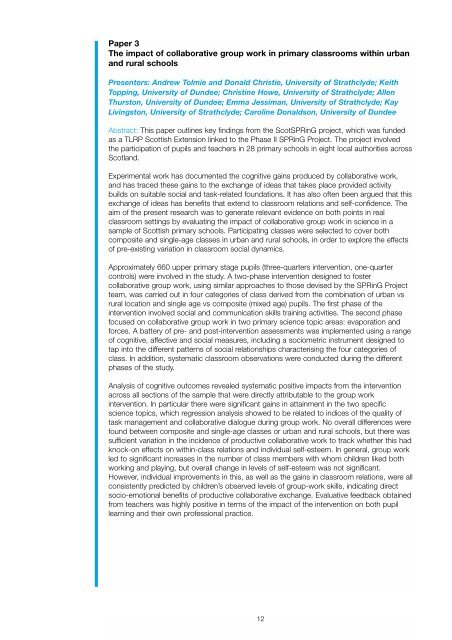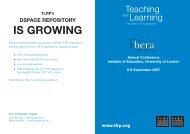Paper 3The impact of collaborative group work in primary classrooms within urban<strong>and</strong> rural schoolsPresenters: Andrew Tolmie <strong>and</strong> Donald Christie, University of Strathclyde; KeithTopping, University of Dundee; Christine Howe, University of Strathclyde; AllenThurston, University of Dundee; Emma Jessiman, University of Strathclyde; KayLivingston, University of Strathclyde; Caroline Donaldson, University of DundeeAbstract: This paper outlines key findings from the ScotSPRinG project, which was fundedas a TLRP Scottish Extension linked to the Phase II SPRinG Project. The project involvedthe participation of pupils <strong>and</strong> teachers in 28 primary schools in eight local authorities acrossScotl<strong>and</strong>.Experimental work has documented the cognitive gains produced by collaborative work,<strong>and</strong> has traced these gains to the exchange of ideas that takes place provided activitybuilds on suitable social <strong>and</strong> task-related foundations. It has also often been argued that thisexchange of ideas has benefits that extend to classroom relations <strong>and</strong> self-confidence. Theaim of the present research was to generate relevant evidence on both points in realclassroom settings by evaluating the impact of collaborative group work in science in asample of Scottish primary schools. Participating classes were selected to cover bothcomposite <strong>and</strong> single-age classes in urban <strong>and</strong> rural schools, in order to explore the effectsof pre-existing variation in classroom social dynamics.Approximately 660 upper primary stage pupils (three-quarters intervention, one-quartercontrols) were involved in the study. A two-phase intervention designed to fostercollaborative group work, using similar approaches to those devised by the SPRinG Projectteam, was carried out in four categories of class derived from the combination of urban vsrural location <strong>and</strong> single age vs composite (mixed age) pupils. The first phase of theintervention involved social <strong>and</strong> communication skills training activities. The second phasefocused on collaborative group work in two primary science topic areas: evaporation <strong>and</strong>forces. A battery of pre- <strong>and</strong> post-intervention assessments was implemented using a rangeof cognitive, affective <strong>and</strong> social measures, including a sociometric instrument designed totap into the different patterns of social relationships characterising the four categories ofclass. In addition, systematic classroom observations were conducted during the differentphases of the study.Analysis of cognitive outcomes revealed systematic positive impacts from the interventionacross all sections of the sample that were directly attributable to the group workintervention. In particular there were significant gains in attainment in the two specificscience topics, which regression analysis showed to be related to indices of the quality oftask management <strong>and</strong> collaborative dialogue during group work. No overall differences werefound between composite <strong>and</strong> single-age classes or urban <strong>and</strong> rural schools, but there wassufficient variation in the incidence of productive collaborative work to track whether this hadknock-on effects on within-class relations <strong>and</strong> individual self-esteem. In general, group workled to significant increases in the number of class members with whom children liked bothworking <strong>and</strong> playing, but overall change in levels of self-esteem was not significant.However, individual improvements in this, as well as the gains in classroom relations, were allconsistently predicted by children’s observed levels of group-work skills, indicating directsocio-emotional benefits of productive collaborative exchange. Evaluative feedback obtainedfrom teachers was highly positive in terms of the impact of the intervention on both pupillearning <strong>and</strong> their own professional practice.12
Friday16th September11.00 - 12.30pmContexts, boundary zones <strong>and</strong> boundary objects in lifelong learningPresenters: Richard Edwards, University of Stirling; Zoe Fowler, LancasterUniversityAbstract: From a number of sources there has developed increasing interest in learning as alifelong <strong>and</strong> lifewide process. This has exp<strong>and</strong>ed <strong>and</strong> diversified the domains in whichlearning is now a concern for practitioners <strong>and</strong> the range of people who might beconsidered to have an educational role. Historically, this learning is not new, but the extent ofinterest in it from the wider educational research community is relatively recent <strong>and</strong>seemingly exp<strong>and</strong>ing. Workplaces in particular have become a domain of specific interest,as has the role of supervisors <strong>and</strong> managers in supporting learning. However, other domainssuch as the home <strong>and</strong> community have also become of greater interest to researchers.There is also the influence of, for instance, the growth of the consumer market in learningopportunities <strong>and</strong> the structured, if distributed, opportunities <strong>and</strong> self-structuring practicesprovided by the internet <strong>and</strong> other technologies. The growth of e-learning <strong>and</strong> borderlesseducation raises significant questions regarding the relationships that can be fostered acrosscultures with implications regarding the different cultures of teaching <strong>and</strong> learning in differentcontexts <strong>and</strong> the value placed on different forms of learning. If learning is lifelong <strong>and</strong>lifewide, what then constitutes a learning context <strong>and</strong> the relationship between learning <strong>and</strong>context?This paper will explore questions about the relationships between learning in these differentdomains <strong>and</strong> specific sites. Once we look beyond the context of conventional domains forlearning in education <strong>and</strong> training institutions, allowing context to be extended into thedimension of relationships between individual learners <strong>and</strong> variously defined others mediatedthrough a range of social, organisational <strong>and</strong> technological factors, then the limitations ofmuch conventional pedagogy come into sharp focus. For this purpose, the paper will drawupon theories of situated learning, activity theory <strong>and</strong> actor-network theory to suggestdifferent conceptual framings through which to underst<strong>and</strong> the differences represented bylifelong learning. The paper is theoretically driven <strong>and</strong> conceptual in nature <strong>and</strong> arises fromwork undertaken within the UK <strong>Teaching</strong> <strong>and</strong> <strong>Learning</strong> <strong>Research</strong> <strong>Programme</strong>.Friday16th September12.45 – 2.15pmSYMPOSIUM PRESENTATIONThe impact of policy on learning <strong>and</strong> inclusion in the new learning <strong>and</strong> skillssystemChair: Ken Spours, Institute of Education, University of LondonDiscussant: Stephen J. Ball, Institute of Education, University of LondonAbstract: Since January 2004, our project, which is part of the ESRC-funded <strong>Teaching</strong> <strong>and</strong><strong>Learning</strong> <strong>Research</strong> <strong>Programme</strong>, has been exploring the impact of the changes to thelearning <strong>and</strong> skills sector (LSS), following the establishment of the <strong>Learning</strong> <strong>and</strong> SkillsCouncil (LSC). Key questions which we have been addressing include:• What changes have taken place in the policy l<strong>and</strong>scape of the LSS since 1997?• What policies on teaching learning <strong>and</strong> assessment have been developed, <strong>and</strong> what hasbeen their impact?• What differences have the policies made to the organisation of provision <strong>and</strong> to teachinglearning <strong>and</strong> assessment for students on Level 1 <strong>and</strong> Level 2 courses in further educationcolleges, <strong>and</strong> in community <strong>and</strong> work-based sites of learning?• What is happening to those without 5 grade A*–C GCSEs, or unemployed adults withbasic skills needs seeking to enter or re-enter the workforce?These are some of the questions we shall be considering in our papers presented at thissymposium.Our principal concern in our first year of the research has been to underst<strong>and</strong> theperspectives of a broad range of participants in the system. On the one h<strong>and</strong>, we haveconducted around 70 interviews with important players in the new learning <strong>and</strong> skills13
















